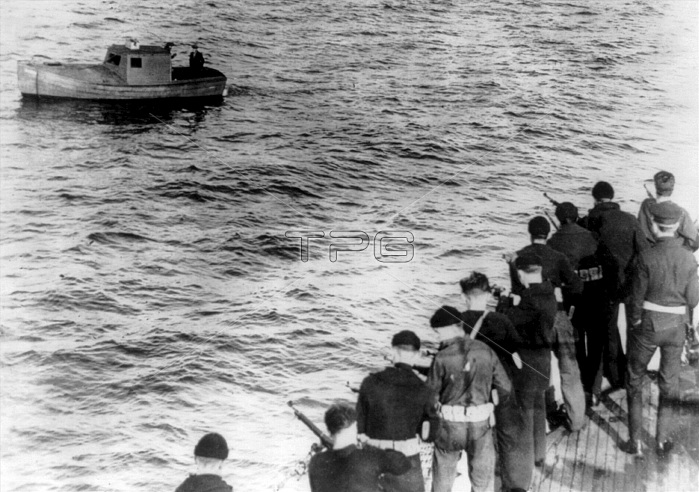
Entitled: "One of the rum runners at night and its nemesis; the K-13091 along side the Seneca at the end of the chase." Coast Guardsmen with rifles along deck facing small boat. Prohibition in the United States was a nationwide Constitutional ban on the sale, production, importation, and transportation of alcoholic beverages that remained in place from 1920 to 1933. It was promoted by dry crusaders movement, led by rural Protestants and social Progressives in the Democratic and Republican parties, and was coordinated by the Anti-Saloon League. Prohibition was mandated under the Eighteenth Amendment to the U.S. Constitution. Enabling legislation, known as the Volstead Act, set down the rules for enforcing the ban and defined the types of alcoholic beverages that were prohibited. Private ownership and consumption of alcohol was not made illegal under federal law; however, in many areas local laws were more strict, with some states banning possession outright. Prohibition supporters, called drys, presented it as a victory for public morals and health. Anti-prohibitionists, known as wets, criticized the alcohol ban as an intrusion of mainly rural Protestant ideals on a central aspect of urban, immigrant, and Catholic life. Nationwide Prohibition ended with the ratification of the Twenty-first Amendment, which repealed the Eighteenth Amendment, on December 5, 1933. No photographer credited, dated 1924.
| px | px | dpi | = | cm | x | cm | = | MB |
Details
Creative#:
TOP22172475
Source:
達志影像
Authorization Type:
RM
Release Information:
須由TPG 完整授權
Model Release:
N/A
Property Release:
No
Right to Privacy:
No
Same folder images:

 Loading
Loading